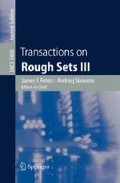Abstract
The paper examines Formal Concept Analysis (FCA) and Rough Set Theory (RST) against the background of the theory of finite approximations of continuous topological spaces. We define the operators of FCA and RST by means of the specialisation order on elements of a topological space X which induces a finite approximation of X. On this basis we prove that FCA and RST together provide a semantics for tense logic S4.t. Moreover, the paper demonstrates that a topological space X cannot be distinguished from its finite approximation by means of the basic temporal language. It means that from the perspective of topology S4.t is a better account of approximate reasoning then unimodal logics, which have been typically employed.
Access this chapter
Tax calculation will be finalised at checkout
Purchases are for personal use only
Preview
Unable to display preview. Download preview PDF.
References
Aiello, M., van Benthem, J.: Logical patterns in space. In: Barker-Plummer, D., et al. (eds.) Logic Unleashed: Language, Diagrams, and Computation, CSLI Publ., Stanford
Demri, S.P., Orłowska, E.S.: Incomplete Information: Structure, Inference, Complexity, Monographs in Theoretical Computer Science. Springer, Heidelberg
Düntch, I., Gediga, G.: Modal-style operators in qualitative data analysis. In: Proc. of the 2002 IEEE Conference on Data Mining (ICDM 2002), pp. 155–162 (2002)
Düntsch, I., Gediga, G.: Approximation operators in qualitative data analysis. In: de Swart, H., Orłowska, E., Schmidt, G., Roubens, M. (eds.) Theory and Applications of Relational Structures as Knowledge Instruments. LNCS, vol. 2929, pp. 216–233. Springer, Heidelberg (2003)
Erne, M., et al.: A primer on Galois connections (1991), http://www.math.ksu.edu/~strecker/primer.ps
Järvinen, J., Kortelainen, J.: A note on definability in Rough Set Theory
Lin, T.Y., Liu, Q.: First order rough logic I: approximate reasoning via rough sets. Fundamenta Informaticae 27, 137–153 (1996)
May, J.P.: Finite topological spaces, http://www.math.uchicago.edu/~may/
McCord, M.C.: Singular homology groups and homotopy groups of finite topological spaces. Duke Mathematical Journal 33, 465–474 (1966)
Orłowska, E.: Rough set semantics for non-classical logics. In: Ziarko, W.P. (ed.) Rough Sets, Fuzzy Sets and Knowledge Discovery, pp. 143–148. Springer, London (1994)
Rasiowa, H., Skowron, A.: Approxiamtion logic. In: Proceedings of the International Spring School, Mathematical Methods of Specification and Synthesis of Software Systems (1985)
Sorkin, R.D.: Finitary substitute for continuous topology. Int. J. Theoretical Physics 30, 923 (1991)
Pawlak, Z.: Rough sets. Int. J. Computer and Information Sci. 11, 341–356 (1982)
Wille, R.: Reconstructing lattice theory: An approach based on hierarchies of concepts. In: Rival, I. (ed.) Ordered Sets, NATO Advanced Studies Institute, pp. 445–470. Reidel, Dordrecht (1982)
Wolski, M.: Galois connection and data analysis. Fundamenta Informaticae 60(1-4), 401–415 (2004)
Yao, Y.Y., Lin, T.Y.: Generalizations of rough sets using modal logic. Journal of the Intelligent Automation and Soft Computing 2, 103–120 (1996)
Yao, Y.Y.: A comparative study of Formal Concept Analysis and Rough Set Theory in data analysis. Rough Stes and Current Trends in Computing, 59–68 (2004)
Author information
Authors and Affiliations
Editor information
Editors and Affiliations
Rights and permissions
Copyright information
© 2005 Springer-Verlag Berlin Heidelberg
About this paper
Cite this paper
Wolski, M. (2005). Formal Concept Analysis and Rough Set Theory from the Perspective of Finite Topological Approximations. In: Peters, J.F., Skowron, A. (eds) Transactions on Rough Sets III. Lecture Notes in Computer Science, vol 3400. Springer, Berlin, Heidelberg. https://doi.org/10.1007/11427834_11
Download citation
DOI: https://doi.org/10.1007/11427834_11
Publisher Name: Springer, Berlin, Heidelberg
Print ISBN: 978-3-540-25998-5
Online ISBN: 978-3-540-31850-7
eBook Packages: Computer ScienceComputer Science (R0)

